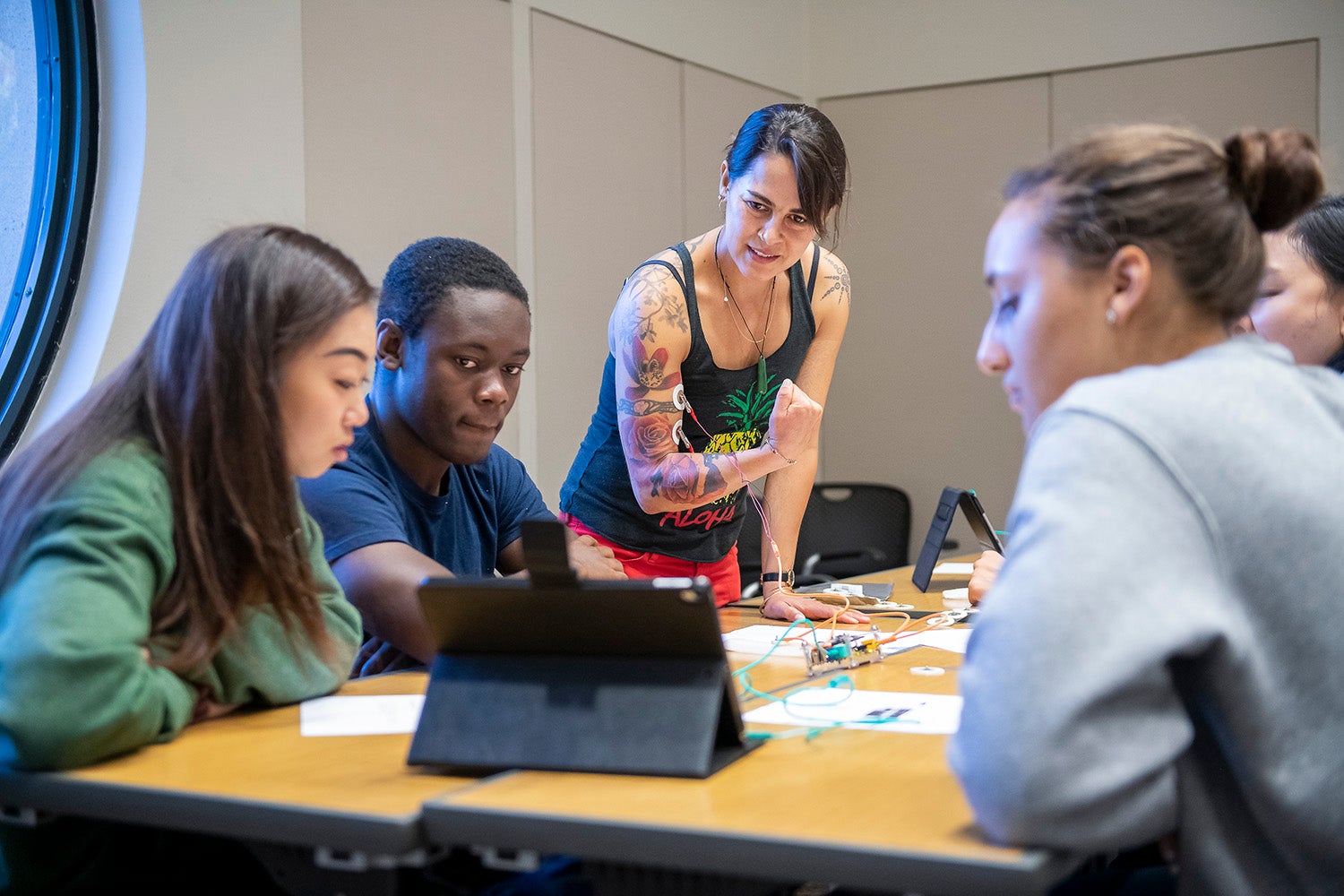On a recent autumn day, Provost Persis Drell was strolling across the campus of the University of Notre Dame on her way to cheer for the Stanford Cardinal football team when she heard a friendly voice call out, “Persis!”

Stanford lecturer Lupita Ruiz-Jones generates electrical impulses by flexing her biceps during a class meeting of How Does Your Brain Work? Ruiz-Jones, who earned a PhD in marine biology at Stanford, is an alumna of the DARE fellowship program. (Image credit: L.A. Cicero)
Drell turned to greet Maria Holland, who earned a doctorate in mechanical engineering at Stanford in 2017, and is now an assistant professor at Notre Dame.
In addition to being an alumna of Stanford, Holland is also an alumna of the university’s Diversifying Academia, Recruiting Excellence Doctoral Fellowship Program (DARE), which prepares students from diverse backgrounds to pursue and succeed in academic careers.
Looking back, Holland said the most valuable part of the DARE program was the community of supportive, open people who cared about her – not just her career.
“I recently read the book Every Other Thursday, which is about a group of women scientists who met every two weeks for more than 25 years to support and encourage and guide each other,” said Holland, who runs a lab that uses solid mechanics and computational approaches to address important questions about the brain.
“The phrase that especially stuck out for me in the book was ‘cooperative action in a competitive world,’ which is such a good description of DARE.”
Holland is one of 153 alumni of DARE, which will celebrate its 10th anniversary Nov. 11-13 at the DARE@10 Homecoming: Conference & Celebration.
“After 10 years of the program, we’re seeing the ripple effect of DARE,” Drell said of her chance encounter with Holland. “The fellows receive support to pursue academic careers while, at the same time, they enrich the educational experience of others at Stanford and, at the end of the fellowship, well beyond our campus.”
Helping create the faculty of tomorrow
Under DARE, Stanford awards fellowships to doctoral candidates during the last two years of their degree programs. The fellowships were designed for PhD students who want to investigate and prepare for academic careers, and whose presence will help diversify the professoriate. The program includes workshops, field trips and seminars.
Alumni of DARE have found positions in academia, industry and government across the United States – from California to Massachusetts – and in three other countries. Click here for a map showing their current placements, produced by the Office of the Vice Provost for Graduate Education, which created the program in 2008.
Seventy-two percent of DARE alumni are working in the academic sector in tenure-track positions, as postdoctoral scholars and in other professional academic positions in institutions large and small, public and private.
Patricia J. Gumport, vice provost for graduate education and postdoctoral affairs, said she hopes the success of the DARE program will inspire other universities to follow suit.
“DARE has a bold vision and a decade of impact thus far in preparing our outstanding doctoral students for faculty careers and leadership roles at a range of colleges and universities,” said Gumport, who is also a professor of education.
“I hope DARE alumni will return to the Farm to enrich the educational experiences of our own students, drawing on their impressive academic expertise. They are compelling role models of the necessity of diversity and inclusion for the future vitality of higher education.”
Making a mark in academia
Since earning doctorates on the Farm, DARE alumni have been teaching, setting up laboratories, doing research, writing journal articles and publishing books.
And, in the case of Deji Akinwande, traveling to Washington, D.C., to accept a 2016 Presidential Early Career Award for Scientists and Engineers from President Barack Obama during a White House ceremony.
Akinwande, an associate professor of electrical and computer engineering at the University of Texas at Austin, where he oversees a lab focused on translational nanotechnology, reflected on his time as a DARE Fellow: “The important thing DARE gave me was wide insight into the life of a professor – a life I could see myself becoming part of and enjoying.”
Former DARE Fellow Chelsey S. Simmons is now an assistant professor of mechanical engineering at the University of Florida, where she runs a lab that conducts research projects related to stem cell biology, pancreatic cancer and tumor modeling.
Simmons said the relationships she formed through DARE helped her through the challenging transition from graduate student to faculty member.
“There have been multiple occasions when I needed someone on the outside to give me a pep talk,” she said. “In the two years I spent with the DARE cohort I was surrounded by people who really made an effort to understand my personal and my professional goals.”
Ali A. Valenzuela, an assistant professor of politics at Princeton University and co-author of the study, “Vote Switching in the 2016 Election: How Racial and Immigration Attitudes, Not Economics, Explain Shifts in White Voting,” remembers giving a research presentation to his DARE cohort eight years ago.
“I still remember one comment that I still pass on to graduate students even today, ‘You did a really good job defending your research without being defensive about it,’” Valenzuela said. “The experience was especially helpful in preparing me for life as a professor, because ‘defend your work without being defensive’ is a mantra I try to live by every time I lecture or present my work.”
Among the DARE alums who chose to pursue careers in administration are two people who are championing Stanford’s diversity efforts: Marlette Jackson, assistant director of diversity and inclusion in the School of Engineering, and Chris Gonzalez Clarke, assistant vice provost and director of the Enhancing Diversity in Graduate Education Fellowship Program in the Office of the Vice Provost for Graduate Education.